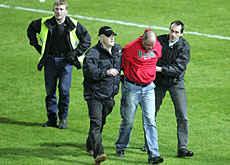Anti-hooliganism rules split parliament

Parliament is due to begin debating a series of measures aimed at cracking down on increasing violence at sports grounds around Switzerland.
The move comes ahead of the 2008 European football championships that are being jointly hosted by Switzerland and neighbouring Austria.
The proposed measures include a national database of hooligans, travel restrictions and banning orders for known troublemakers.
The bill also foresees preventive detention as well as increased powers for police and the customs authorities to confiscate violence-inciting propaganda material.
The government says similar steps introduced in other countries have proven successful and would also boost internal security in Switzerland.
Violence among extremist fans and other troublemakers in Switzerland has been on the rise over the past few years.
As a result, the Swiss football and ice hockey authorities introduced hefty fines and other penalties for clubs whose supporters misbehave.
Tests are also underway with a security system using biometric data to identify hooligans at ice hockey games.
Pressure
The legal amendments are likely to be passed by the House of Representatives, according to Luzi Stamm, a parliamentarian and member of the legal affairs committee.
He said neither his rightwing Swiss People’s Party nor the centre-right parties saw any major flaw in the bill.
“I think the proposals will go through without too much opposition in parliament because the pressure is on to amend Swiss legislation in time for Euro 2008,” he said.
Stamm added that one point of contention was whether the legislation should be limited until the end of 2008 or made permanent.
Unnecessary, unjustified
On the other side of the political spectrum, the centre-left Social Democratic Party and the Green Party argue that the planned measures go too far, notably the idea of setting up a hooligan database.
“It’s all about pleasing Uefa [European football’s governing body],” said Green Party parliamentarian Daniel Vischer.
Vischer believes the law not only “overshoots the mark” but is also unconstitutional.
“The federal authorities have no right to interfere in cantonal police matters, and the current regulations are sufficient,” he said.
He also criticised football clubs for demanding a bigger role from the federal authorities in the fight against hooliganism.
Prevention
Vischer’s statements echoed reservations by experts who work with football fans.
David Zimmermann, a psychologist, told swissinfo earlier this year that the planned measures were an “overreaction”.
He said the government should focus on prevention, adding that the best way to tackle the problem of hooliganism was if police and fan groups worked together.
The Senate, the other parliamentary chamber, is due to discuss the anti-hooliganism measures next year.
Parliament is also due to have a say next year on controversial plans by the government to contribute SFr72 million ($55.2 million) in funds for Euro 2008, the bulk of it to cover security costs.
Initially the cabinet had earmarked just SFr3.5 million for the event.
swissinfo, Urs Geiser
Proposed anti-hooliganism measures include a national hooligan database, preventive detention, travel restrictions and banning orders.
Switzerland is hosting Euro 2008 with neighbouring Austria. The tournament is due to begin on June 7, 2008.
Violence has been on the rise at football and ice hockey stadiums in Switzerland over the past few years.
Parliament is due to begin discussions this week on government plans to crack down on hooligans at sports stadiums.
The bill has met opposition from the centre-left and Greens, but the majority centre-right and rightwing look set to approve it.
A SFr72 million ($55.2 million) credit package for Euro 2008 will be debated in a separate bill in parliament next year.

In compliance with the JTI standards
More: SWI swissinfo.ch certified by the Journalism Trust Initiative












You can find an overview of ongoing debates with our journalists here . Please join us!
If you want to start a conversation about a topic raised in this article or want to report factual errors, email us at english@swissinfo.ch.